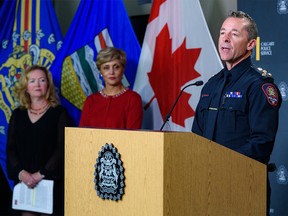In a year it only received 240 calls, said Alex CEO Joy Bowen-Eyre, even after it had expanded from one police district to city-wide coverage

A one-year pilot project teaming city police and social workers to help address Calgary’s mental health problems failed to gain much traction, says one of its participants.
It’s an initiative that was seen partly as a way to prevent incidents from escalating into violent confrontations with police or others.
But in a year, it only received 240 calls, said The Alex CEO Joy Bowen-Eyre, even after it had expanded from one police district to city-wide coverage.
“We weren’t getting the calls … when you think of 911 and 311, it was really low,” she said of the $2.5-million initiative.
“That’s disheartening for The Alex, the CPS — the teams were skilled, ready to be dispatched but the dispatches never really happened. It’s like ‘let’s go back to the drawing board.’”
That lack of work wasn’t because there’s no demand among Calgarians for mental health assistance, said Bowen-Eyre.
“I think there’s a great need in Calgary for mental health supports, people just don’t know where to turn or how to navigate that when there is a crisis,” she said.
“We see where people are not coping well at all … I wish I had the magic answer, but mental health is complex.”
‘When they did connect, it was magical’
There are 30 different agencies dealing with mental distress and it’s a challenge to coordinate their efforts, said Bowen-Eyre.
But Bowen-Eyre said the teams proved their worth in the cases they did handle, directing those 240 callers to 1,842 referral points, such as various social agencies.
“It was really, really effective — when they did connect, it was magical,” she said, adding those teams were not sent into situations where a safety risk was present.

Most of those calls, said Bowen-Eyre, involved crises linked to access to basic needs like food, clothing and the ability to meet housing or utility payments.
And the goal of responding to those initial calls within 30 minutes was met, she said, by teams that were able to connect callers with things like emergency food supplies or transit tickets.
Lessons from the pilot are being reviewed with a view to employing them, CPS said in an email.
“The CPS sees immense value in community-based crisis response,” they said.
“We hope that in the future we can see the development of alternate primary crisis response services that are best suited for the community.”
Redirecting 911 calls to 211 sees more uptake
When the pilot project was announced two years ago, Mayor Jyoti Gondek said the program offered an opportunity to “transform how Calgarians are supported during a period of crisis” and alleviate call demand for police.
“The community mobile crisis response pilot is designed to fill existing gaps in Calgary’s current crisis response model by providing an alternative to those in need of urgent support due to a non-emergency, mental or emotional distress, or conflict,” said Gondek.
A separate initiative has been greeted with significantly more uptake.
“The crisis response initiatives the CPS is involved with focus on partnering with community agencies to ensure individuals experiencing non-emergency mental health or addiction-related crisis receive the right resources at the right time,” said CPS in an email.
“This typically comes in the form of a response from, or referral to a community partner that is best-suited to the situation.”
Fatal encounters with Calgary police
Police in Calgary and elsewhere have come under criticism in recent years for how they deal with critical situations involving mental health.
There have been several instances of suspects believed to be suffering from mental health issues being killed in confrontations with Calgary police.
“At the end of the day, sometimes police are put into impossible situations where somebody in crisis is in a place where the likelihood of achieving a peaceful outcome is almost impossible,” he said.
“In cases like that, you have to look back and say, ‘Were there possibilities or opportunities to be able to intervene or connect somebody with services and support?’ There might have been opportunities to prevent these things from happening and that’s to everybody’s benefit.”
‘The intention is good’
Since 2009, CPS has operated a Police and Crisis Team (PACT) consisting of officers with medical professionals that respond to people who come into contact with the law, grappling with mental health, addictions or psychosocial problems who could pose a danger to themselves or others.
It seeks to divert people from hospital emergency departments and the justice system.
“The intention is good … my guess is they’re very under-resourced,” said Tom Engel, chair of the Criminal Trial Lawyers’ Association’s policing committee.
In 2021, PACT’s personnel was expanded and its coverage extended from 18 to 22 hours a day.
CPS said in 2022 that 20 per cent of its calls were mental health or addictions-related, or about 100 per day.
— With files from Michael Rodriguez